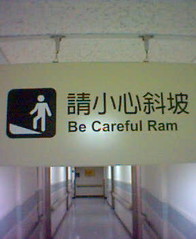去年有一個年輕人來找我,他有遠端橈骨的骨折,外地受傷,在其他醫院已經打好石膏,回來本地醫院複診。 後續的追蹤治療當中,我認為骨折雖然變形增加,但是還可以接受。 不料病人到其他醫院,卻說要開刀治療,不開刀不行。
病人在那裡開了刀,回頭向我們醫院要求損害賠償,因為我耽誤了他治療的時間,雖然他終究開了刀,但是他失去了幾個月的工作能力,這部份要我們醫院負責。 顯然病人背後有高人指點,不要我們的探視和解釋,只要金錢。 後來醫院就用小小的金錢擺平了這件事。
醫院評鑑之後,院方回頭再跟我開會討論攤還的比例。 開會的時候我強調就是有些醫師超級愛開刀,開刀的效果也沒有比保守治療好。 無奈醫院並不接受我的說法,認為我應該在當時將開刀及保守治療的優缺點兩面並呈,供病人選擇。 所以我心裡看到病人的影像所得到的第一個判斷,不必開刀,佐以我豐富的臨床經驗,並不足以在未來病人回頭投訴我的時候,證明我是正義的。
所以我必須出錢分攤賠償,這令我感到難過。
令我難過之餘,我必須要採取新的做法,防禦性的醫療。 每一個病人我現在看到的,只要有一點點可能需要開刀的,我就必須說到手術治療這個字眼。 還要謙卑再謙卑,不能替病人決定。 也許可以參看這篇:
From Medscape General Medicine
Webcast Video Editorials
The Functioning Brains of Us Physicians Should Be "Guidance Systems," Not "Books of Knowledge"
Posted 12/08/2006
F. Hampton Roy, MD
"We are a guidance system, not a book of knowledge," Dr. Lawrence Weed wrote in 1968.[1,2] Then, as now, medical information was expanding exponentially. Each of us physicians needs information sources for an accurate, complete differential diagnosis and for specific diseases.
As physicians, we do not need to carry information about lab tests, medications, or dosages in our heads. We need a reliable ready source of information to consult, and we need to be in charge of providing the patient with excellent quality of care by being a guidance system.
For continuing education and recertification, specific information is usually requested. I classify that as "book of knowledge" information, but a more relevant avenue would be to test the thought-planning process, which is the "guidance system.[3]"
In today's world of readily available information, we are at times assisted by the patient.[4,5] It is not uncommon, once a diagnosis has been made, for the patient to present to us reams of paper that include information about diagnostic tests, disease manifestations, medications, nutritional supplements, and alternative treatments. Since we are now "partners" with the patient in terms of diagnosis and treatment, we need to honor the patient's book of knowledge and provide our best guidance system. This can only increase the quality of care to the patient.[6]
With better sources of information for the patient and the doctor and a better understanding of disease processes, I feel medical care will continue to improve mostly as our guidance systems improve.
That's my opinion. I'm Dr. Hampton Roy, a practicing ophthalmologist in Little Rock, Arkansas, and a member of the eMedicine Editorial Board.
那天有個廠商來聊天,我忍不住吐苦水。 他聽完還知道我這是第一次遇到這種事情,竟然安慰我這只是個小case,他所認識的醫師,比這種情況嚴重的很多,要我不要煩惱了。
偏偏我以為,我這麼謹慎小心,始終以病人利益為出發點,怎麼可能發生呢? 對照之下,每個說可能要開刀之後,我的刀數變多了。 我不能裡解這究竟是對我人生的諷刺,是現實的揭露,還是我真正做到了更符合這個社會價值觀的要求呢?


